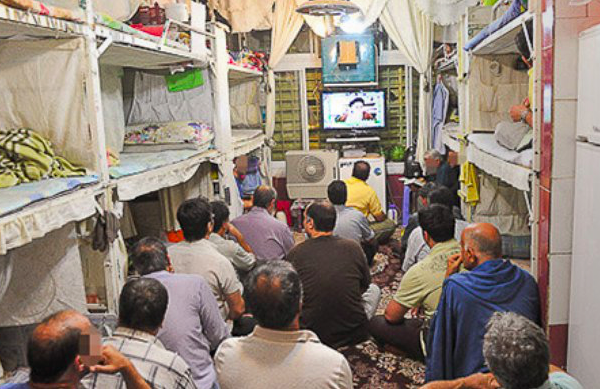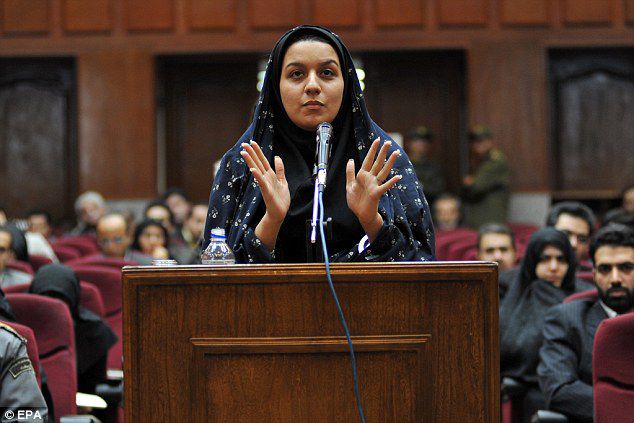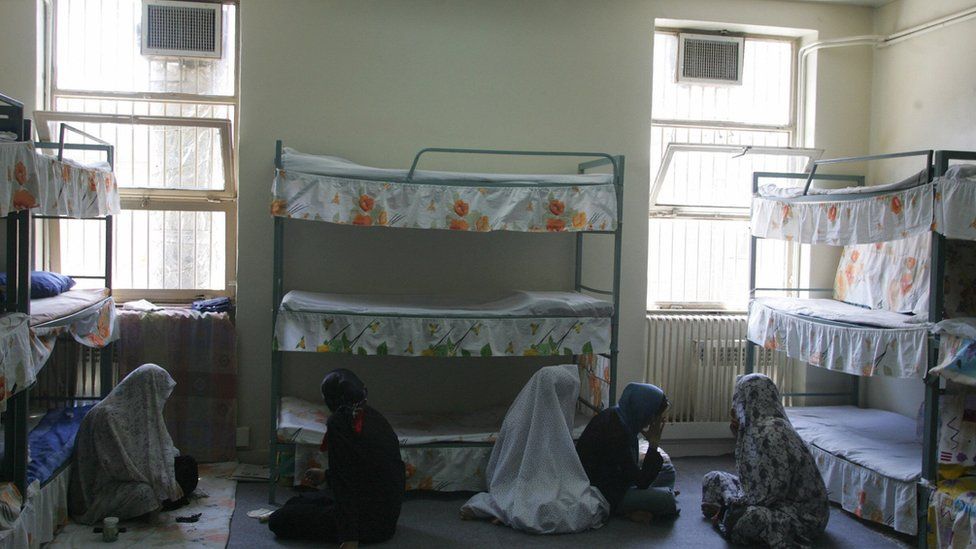-
Iranian prison "Evin": number one human slaughterhouse in the world

Evin University
Evin Prison was named the Evin University, due to the presence of a large number of intellectuals in this prison, and it is considered a cemetery for Iranian politicians and opponents. These walls, which contain thousands of detainees, are guarded by security guards with a special connection to the Revolutionary Guards, where well-known Iranian personalities, such as Muhammad Reza Rahimi, right-hand of the former Iranian president, Mahmoud Ahmadinejad, Mahdi Hashemi, son of Ali Akbar Hashemi Rafsanjani, and activist Dawud Rizvi, labor activist, have been imprisoned here.
The prison was built in 1962 during the era of the Shah of Iran, Mohammad Reza Pahlavi, in the Saadatabad region in the capital, Tehran, with an area of more than 43 hectares, and the prison was divided according to personalities and charges. Hence, ward 209, which is run by Iranian intelligence and the Revolutionary Guards, had the largest share of fame. By bringing well-known opponents to be tortured and killed. Beside Wing 350, which is administered by the judiciary and called the third branch, it was initially designed to accommodate 320 prisoners, including 20 in solitary cells, and 300 in two large collective sectors, which was expanded to contain more than 1500 prisoners, including 100 isolated cells for the most important political prisoners. It was later expanded during the reign of the mullahs and now accommodates 15,000 prisoners.
 Evin University
Evin UniversityEngineer Rehana Jabari: One of the most famous prison victims
The prison was notorious for its bad reputation during the Pahlavi regime, and soon the news began to increase about the adverse conditions in this prison after the Iranian revolution in 1979 and with the clergy taking over the government, as crimes occurred to be committed more strongly against political detainees and opponents of the mullahs' rule.
During the reign of Hassan Rouhani, the prison became known globally, where the Iranian engineer Rehana Jabbari was executed, after defending herself in front of an attack attempt by a former Iranian official with Iranian intelligence, along with the arrest of Iranian Peruvian club goalkeeper, player Sosha Makani, who was released on bail a few days ago.
The name Muhammad Kajoyi came to prominence during his tenure in the prison administration, where he carried out a series of executions that included senior officers and officials during the Shah’s era, including the Prime Minister of that era Abbas Kajoyi. After the assassination of Kajoyi in 1981, his name was given to a prison in the city of Karaj, northwest of the capital.
 Engineer Rehana Jabari: One of the most famous prison victims
Engineer Rehana Jabari: One of the most famous prison victimsPrison whitening massacre
In 1988, Asadullah Lajurdi managed the prison and committed the massacre of "prison whitening," when the supreme authority of the Shiites, Ruhullah Khomeini, ordered it after the Iran-Iraq war, under the name of liquidating those who described them as apostates and atheists, and thousands were executed, most of them supporters of the PMOI.
Wings with rooms for the accused were also allocated, and for the execution of death sentences, in which the most prominent opposition fighters, the Mujahideen Khalq, were executed. During Khomeini's rule during the early 1980s, the 36-square-meter room sometimes contained more than 120 prisoners, according to a report by the Mujahideen Khalq opposition.
White torture
This prison was famous for a form of torture called white torture, “Shingej Safid," through which thousands of Iranian political opponents are slaughtered, and it is a type of psychological torture, which includes brutality in sensory deprivation, which makes the detainee lose his identity with the decrease in his human production through Long periods of isolation.
In 2004 Amnesty International documented irrefutable evidence relating to the white torture practiced on the prince of Abbas Fakhr Awar of the Revolutionary Guards.
Sexual assaults on women and executions of children
Alongside the psychological types and methods of torture, international reports have emerged about Iranian women being subjected to torture and ill-treatment by photographing them in the showers, through secret cameras in the second women's section, which is supervised by the IRGC intelligence.
The prison administration not only tortured and arrested opposition women and men, but also imprisoned many juveniles under the age of 18, and international accusations were made in violation of international law and the execution of juveniles convicted of crimes. At the same time, they were under the age of 18, contrary to international law and its obligations under international laws, along with executions that included These children.
 Sexual assaults on women and executions of children
Sexual assaults on women and executions of childrenLebanese Nizar Zakka, the last survivor of Evin Prison
He had been detained in Evin Prison, a former Lebanese technology and information expert, Nizar Zakka, who was subjected to the worst forms of physical torture. After that, psychological torture began, as he was released after interventions from Lebanon. After his release, he confirmed the existence of hundreds of detainees unjustly while revealing that he was detained With three prisoners, American, British and Austrian, in Evin prison.
He added that there are innocent people of Arab nationalities from Iraq and others residing in America, Sweden, England, and Austria inside the prison. He revealed that during the first period, he was subjected to unspeakable pressure by the Revolutionary Guards to say that he is a spy. Still, he refused this, saying that he was placed for more than a year in solitary confinement, and then transferred to a shared cell.
During his release and his arrival in Lebanon, he confirmed that the Revolutionary Guards were the ones who arrested him, not the official intelligence services, because he was invited to Tehran by the Iranian state, as he was sent an official invitation in 2015 by the Vice-President of the Iranian Republic, Hassan Rouhani, to participate in the information technology conference And create jobs for women.
This prison adds to hundreds of violations by the mullahs' authorities in Iran, where the Iranian Evin prison is one of the mass graves in which political prisoners and detainees, activists and journalists are subjected to the most violent types of torture, in addition to killings and exaggeration of new kinds of torture, while preventing any international bodies Visit or examine the prison.
You May Also Like
Popular Posts
Caricature
BENEFIT Sponsors BuildHer...
- April 23, 2025
BENEFIT, the Kingdom’s innovator and leading company in Fintech and electronic financial transactions service, has sponsored the BuildHer CityHack 2025 Hackathon, a two-day event spearheaded by the College of Engineering and Technology at the Royal University for Women (RUW).
Aimed at secondary school students, the event brought together a distinguished group of academic professionals and technology experts to mentor and inspire young participants.
More than 100 high school students from across the Kingdom of Bahrain took part in the hackathon, which featured an intensive programme of training workshops and hands-on sessions. These activities were tailored to enhance participants’ critical thinking, collaborative problem-solving, and team-building capabilities, while also encouraging the development of practical and sustainable solutions to contemporary challenges using modern technological tools.
BENEFIT’s Chief Executive Mr. Abdulwahed AlJanahi, commented: “Our support for this educational hackathon reflects our long-term strategic vision to nurture the talents of emerging national youth and empower the next generation of accomplished female leaders in technology. By fostering creativity and innovation, we aim to contribute meaningfully to Bahrain’s comprehensive development goals and align with the aspirations outlined in the Kingdom’s Vision 2030—an ambition in which BENEFIT plays a central role.”
Professor Riyadh Yousif Hamzah, President of the Royal University for Women, commented: “This initiative reflects our commitment to advancing women in STEM fields. We're cultivating a generation of creative, solution-driven female leaders who will drive national development. Our partnership with BENEFIT exemplifies the powerful synergy between academia and private sector in supporting educational innovation.”
Hanan Abdulla Hasan, Senior Manager, PR & Communication at BENEFIT, said: “We are honoured to collaborate with RUW in supporting this remarkable technology-focused event. It highlights our commitment to social responsibility, and our ongoing efforts to enhance the digital and innovation capabilities of young Bahraini women and foster their ability to harness technological tools in the service of a smarter, more sustainable future.”
For his part, Dr. Humam ElAgha, Acting Dean of the College of Engineering and Technology at the University, said: “BuildHer CityHack 2025 embodies our hands-on approach to education. By tackling real-world problems through creative thinking and sustainable solutions, we're preparing women to thrive in the knowledge economy – a cornerstone of the University's vision.”
opinion
Report
ads
Newsletter
Subscribe to our mailing list to get the new updates!






















